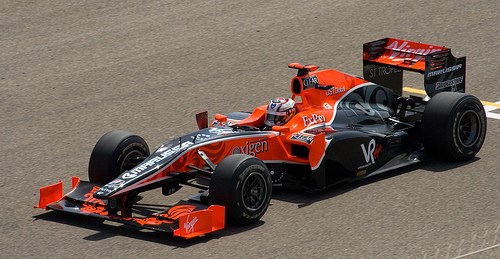Tension in Bahrain might lead to cancellation of the Formula One Grand Prix

Demonstrations and unrest may cause a cancellation of the Bahrain Grand Prix next weekend, just as it happened last year. Photo: Andrew Griffith/Flickr
11.04.2012
By Play the GameMounting trouble in the Gulf state might mean a cancellation of the Formula One Grand Prix next weekend. Formula One chief Bernie Ecclestone said yesterday that the racing teams will have the final say over whether the Bahrain Grand Prix will go ahead or not.
Bahrain is experiencing mounting tension as Abdulhadi al-Khawaja, an imprisoned anti-government activist who has been on hunger strike for more than 60 days, is feared to be close to death and a bomb blast this Monday injured seven policemen.
The bomb, which is said to be detonated by protesters against the regime and al-Khawaja's continued imprisonment, has been seen by local observers as a worsening of the security situation in the country.
Ecclestone said after the blast that there were commercial reasons for the teams to participate in the Bahrain Grand Prix, but that he would not force them to partake.
"We've no way we can force people to go there," he told the Press Association. "We can't say 'you've got to go' – although they would be in breach of their agreement with us if they didn't go – but it doesn't help. Commercially they have to go, but whether they decide to or not is up to them."
Ecclestone added that no teams had asked to be excused from the race. One team did however tell the Guardian that the race should be cancelled as it could only take place safely under “complete military lockdown”, writes the Guardian.
Al-Khawaja was imprisoned as a result of his fight to bring human rights and democracy to authoritarian Bahrain during the Bahrani revolution last year.
International pressure has been put on the regime in Bahrain to release al-Khawaja, but so far with no result. Sunday, a judicial panel in Bahrain refused Denmark's request to take custody of al-Khawaja, who is also a Danish citizen. On Monday, the UN secretary general, Ban Ki-moon, urged Bahrain to consider reversing that decision on humanitarian grounds.
Human rights organisations such as Amnesty International and Human Rights Watch has also called for al-Khawaja’s release. Human Rights Watch called on Formula One's organising body to think very carefully about staging the race in Bahrain, when spokesman Joe Stork stopped short of calling for a boycott of the Grand Prix.
The Grand Prix was cancelled last year as a result of the demonstrations and crackdown when protesters from Bahrain's majority Shia population took to the streets during the Arab Spring and demanded democratic reforms from the country's Sunni rulers. Dozens of protesters died when they were met with violence from the security forces.
After months of violence, King Hamad commissioned an independent inquiry into events and promised to implement sweeping reforms. But human rights activists say that the inquiry was not independent and the reforms have not taken place, writes BBC.
SOURCE: The Guardian, BBC
http://www.guardian.co.uk/world/2012/apr/10/bahrain-tension-doubt-grand-prix





